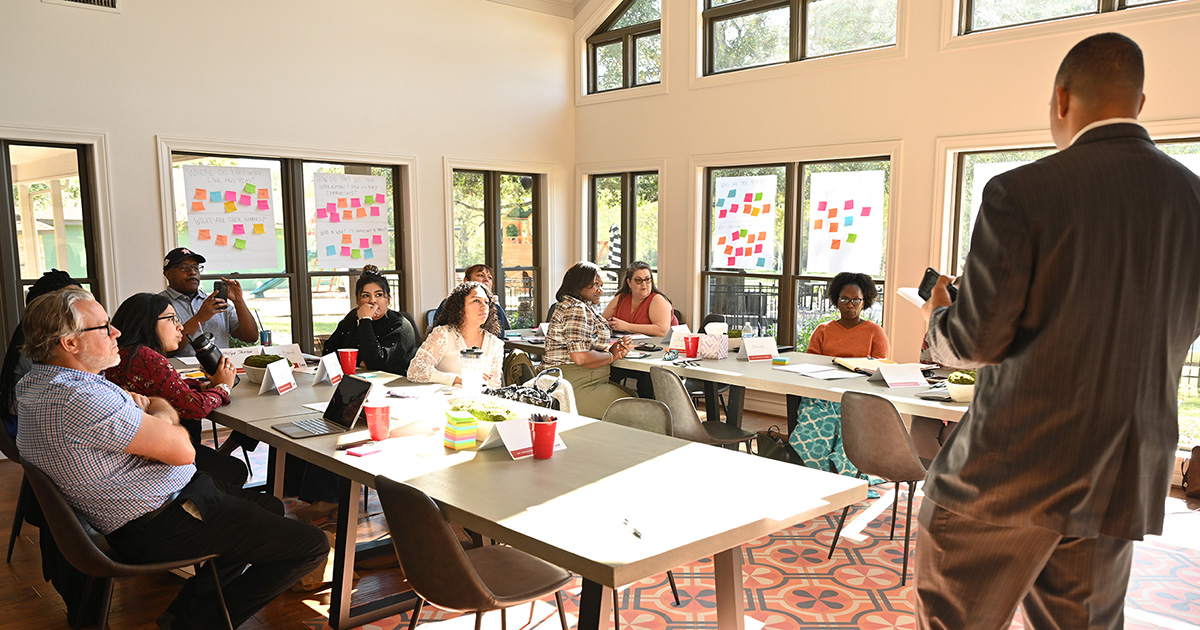Change is hard.
Trying something new can feel risky, or even scary. And it can be daunting to set aside time to brainstorm and try out new ideas when there are so many things demanding our attention every day. It can seem easier to just keep doing what we have done all along, even when it hasn’t been working that well.
But when we want to improve how things work, we need to be open to change.
Social service organizations might find it hard to develop and test improvements to their process because of the daily demands and stress of running a program. They may want to increase their enrollment, improve retention, or strengthen participant engagement, but they struggle to find the time and bandwidth to focus on potential changes. Recognizing this challenge, the Administration for Children and Families launched the SIMR project, which stands for Strengthening the Implementation of Marriage and Relationship Programs. The goal was to support healthy marriage and relationship education (HMRE) programs that want to address pressing implementation challenges. The Administration for Children and Families selected Mathematica and its partner, Public Strategies, to conduct the project.
In SIMR, researchers and practitioners partnered to develop and test new approaches to HMRE service delivery using rapid cycle learning. Teams worked together to develop and try potential solutions, learn from those experiences, and then try again based on what they found.
The project team worked with 10 HMRE grant recipients—five that serve adults and five that serve youth—to strengthen their services and share what they learned.
To make sure other practitioners can use the SIMR findings, the team developed a set of eight practice briefs to share the implementation strategies that they developed and refined as part of the project. These briefs cover strategies for improving recruitment, increasing participant engagement in in-person and virtual services, and strengthening overarching organizational practices that can ensure high-quality service delivery. Here, staff members from the HMRE grant recipients that participated in SIMR describe their experiences developing and testing these strategies.
Improving recruitment
Nathan Kendrick from Gateway Community Services shares how SIMR helped strengthen Gateway’s partnership with other community organizations. Next, Alison Espinola from Family Service Agency-Santa Barbara discusses the importance of understanding the community’s values to inform recruitment efforts.
- Tips for Leveraging Partnerships to Improve Recruitment for HMRE Programs Practice Brief
- Four Tips for Recruiting Spanish-Speaking Immigrant Men into HMRE Programs Practice Brief
Improving participants’ engagement with in-person HMRE services
Marlon Young from More Than Conquerors, Inc. shares how he learned more about helping students set goals during his experience in SIMR. Next, Mary Ann Slanina from Youth & Family Services discusses the importance of planning and debriefing when co-facilitating HMRE workshops in high schools.
- Adopting a Motivation-Driven Approach to Case Management in HMRE Services Practice Brief
- Strategies to Support Co-Facilitation in Classroom Sessions Practice Brief
Improving participants’ engagement with and reinforcing content in virtual HMRE services
Mary Minges from Montefiore Medical Center shares how implementing 15-minute virtual coaching sessions, which the program called Love Bites, provided couples an opportunity to practice new relationship skills outside the regular workshop. Next, Colette Pella from University of Denver’s MotherWise program explains the benefits of offering virtual programming to participants who live in rural areas.
- Tips for Providing Skill Coaching to Reinforce Workshop Content in HMRE Programs Practice Brief
- Tips for Delivering Engaging Virtual Workshop Sessions in HMRE Programs Practice Brief
Strengthening organizational practices that support high-quality service delivery
Chris Liotta from Texas A&M AgriLife Extension discusses the goal of using data: to improve the quality of services for participants. Sophia Medina, also from Texas A&M AgriLife Extension, and Traci Maynigo from Montefiore Medical Center highlight the importance of including all staff as a team when generating ideas to improve services.
- Using Data to Guide Improvement in HMRE Services Practice Brief
- Tips for Creating a Motivating and Supportive Environment for Staff Success in HMRE Services Practice Brief
For programs to be effective at helping the people they serve, they need to be well implemented. But this can be hard to achieve. Practitioners can benefit from the experiences of others who have faced similar challenges and worked through them. The eight SIMR practice briefs, as well as other SIMR products, summarize lessons other organizations can use to help make their programs better. For a list and links to all SIMR publications, visit the SIMR page on the Office of Planning, Research, and Evaluation’s website. You can also learn more about SIMR on Mathematica’s website.




